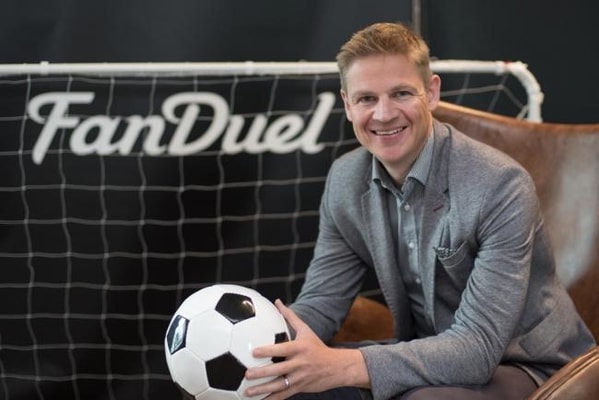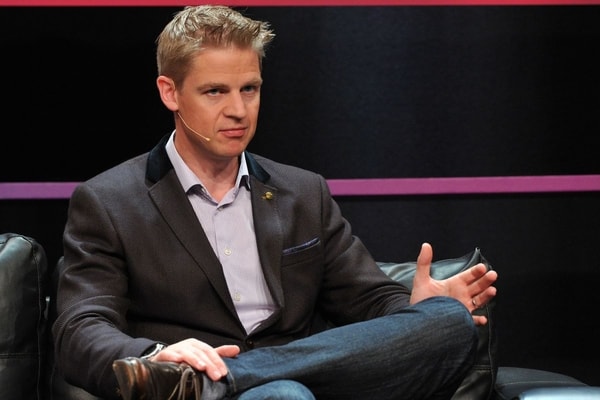
FanDuel CEO Nigel Eccles has decided to leave the company that he co-founded in 2009. This comes just months after FanDuel failed to merge with their rival DraftKings. Eccles will be replaced by Matt King, who was FanDuel’s chief financial officer from 2014 to 2016 starting immediately. While we don’t have a lot of details, we know that Eccles has stepped own in order to start an eSports company. He isn’t leaving on bad terms. In fact, he admits that leaving is going to be a kind of sad. That’s the way you want to go, in my opinion. It means that your time there was good, but that you know you’re moving onto something else. Potentially better for you.
Eccles departure isn’t exactly shocking. When the merger died, Eccles was faced with the prospect of running FanDuel indefinitely rather than taking a reduced role that would have let him pursue a new venture. Eccles had been toying with startup ideas ever since the merger died, so clearly, his entrepreneurial ambitions won out. The daily fantasy sports industry has experienced huge growth in recent years, with players spending an estimated $3.26 billion in 2016, up about 4 percent from a year earlier, according to an annual market study by Eilers & Krejcik Gaming. But that rapid growth has led to questions about how such contests, which offer cash prizes to contestants who compete in abbreviated daily versions of the traditional season-long fantasy sports leagues, might be violating state gambling laws.
While eSports aren’t exactly new, they are emerging in a way that they never have before. And for those of you who aren’t familiar with what eSports are, they are basically a form of competition facilitated by video games. It is usually organized, multi-player video game competitions, and often between professional players. The most common genres associated with eSports are real-time strategy, fighting, and first-person shooter. We are starting to see professional sports teams getting in on the action as well. Which is why this is likely a good move for Eccles.

In fact, Riot Games announced the 10 teams that will be selected for the permanent partnership structure of the League of Legends North American League Championship Series – which includes four that are backed by NBA teams. The teams granted franchises for the “League of Legends” North American League Championship Series are:
- 100 Thieves (new to the league): Established as a pro eSports team and streetwear brand by “Call of Duty” champion and gaming influencer Matthew “Nadeshot” Haag, has received an investment by the Cleveland Cavaliers and venture-capital firms Detroit Venture Partners and Ludlow Ventures.
- Clutch Gaming (new to the league): The eSports venture of the Houston Rockets adopted a name that references the “Clutch City” nickname the basketball team picked up in its run to the 1994 NBA Championship.
- Golden Guardians (new to the league): Team owned by the Golden State Warriors.
- OpTic Gaming (new to the league): Organization specializing in first-person shooter eSports, with its fanbase known as the Green Wall, enters the realm of “League of Legends.”
- FlyQuest: Team formed and backed by Milwaukee Bucks co-owner Wes Edens joined the NA LCS at the beginning of the 2017 season.
- TSM (Team SoloMid): Owns the only team in the “League of Legends” history to attend every World Championship and the only team to appear in every NA LCS finals.
- Cloud9: One of the first teams in the NA LCS, C9 has represented North America at the League of Legends World Championships every year since 2013.
- Counter Logic Gaming: Backed by Madison Square Garden Co., the organization has fielded a long-running NA LCS team that in 2016 were North America champions and MSI finalists.
- Echo Fox: eSports group founded by former NBA all-star Rick Fox, it first fielded a team in the NA LCS in 2016. The New York Yankees last month made an equity investment in Vision eSports, the largest shareholder of Echo Fox.
- Team Liquid (TL): One of the original eSports pro-team brands, founded in 2000, TL was acquired last year by aXiomatic, an ownership and management group led by Jeff Vinik, owner of the Tampa Bay Lightning; Peter Guber, former head of Columbia Pictures Entertainment, who owns the Golden State Warriors; and Ted Leonsis, owner of the Washington Capitals and Washington Wizards.
The point I’m trying to make with Eccles departure is that the eSports industry is already huge, and growing every year. While he may be sad to leave FanDuel, there is a good chance that he will fare well in the eSports industry, and we wish him the best with that.



![Apple Watch Ultra: The best Apple Watch I do not need [Video]](https://9to5mac.com/wp-content/uploads/sites/6/2026/01/AWU-FI.jpg?quality=82&strip=all&w=1600)